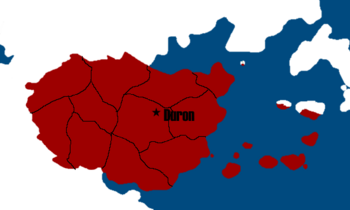Prybourne
This article is incomplete because it is pending further input from participants, or it is a work-in-progress by one author. Please comment on this article's talk page to share your input, comments and questions. Note: To contribute to this article, you may need to seek help from the author(s) of this page. |
Corporatocracia Democrática de Prybourne Democratic Corporatocracy of Prybourne | |
|---|---|
Motto: ¡Que se rompan los martillos y se doblen las hoces! Let the hammers break and the sickles fold! | |
Anthem: Prybourne National Anthem | |
 | |
| Capital | Duron |
| Largest city | Freemont |
| Official languages | English Spanish |
| Demonym(s) | Prybournean |
| Government | Constitutional Corporatocratic Republic |
| Juliana de la Cruz | |
| Luana Arnal | |
| Legislature | National Board of Executives |
| Independence from Canter Republic | |
• Declared | May 22nd 1890 |
| Area | |
• Total | 475,442 km2 (183,569 sq mi) |
• Water (%) | 1.3 |
| Population | |
• 2013 estimate | 75,000,000 |
• 2013 census | 75,423,267 |
• Density | 39.7/km2 (102.8/sq mi) |
| GDP (PPP) | 2011 estimate |
• Total | $45 billion |
• Per capita | $2,257 |
| GDP (nominal) | 2011 estimate |
• Total | $25.759 billion |
• Per capita | $1,230 |
| Gini (2001) | 44.6 medium |
| HDI (2010) | very high · 150th |
| Currency | Pente (PNTE) |
| Time zone | UTC+1 (CST) |
• Summer (DST) | UTC+1 (not observed) |
| Driving side | right |
| Calling code | +201 |
| Internet TLD | .prb |
Prybourne, officially the The Democratic Corporatocracy of Prybourne (Prybournean: Corporatocracia Democrática de Prybourne) is a nation located on Anteria . Founded in TBA following the Canter Uprising, it operates under a conservative Constitutional Corporatocracy system of governance. Led by a Grand Nagus, Prybourne is known for its national ideology called Capitology, which emphasizes profit-seeking and wealth accumulation. The nation faces environmental challenges, such as a persistent smog cloud resulting from industrial activities and the presence of industrial wastelands. As a member of the Canterian Federation, along with Kilowatt and Velnotia, Prybourne actively participates in the collaborative efforts and decision-making processes of the federation.
History
Government
The National Conglomerate of Prybourne is a unique political system that operates as a Corporatocracy in the region of Anteria. Comprising 12 states and several oversea client states, the National Conglomerate is governed by a conglomerate of multiple business entities, forming the national government of Prybourne. This system fosters a close partnership between the government and private enterprise, aiming to ensure the nation's success and prosperity.
The National Conglomerate is divided into three de facto branches: legislative, executive, and judicial, with each branch defined by the Constitution of Prybourne, also known as the Bill of Opportunities. This foundational document outlines the rights and responsibilities of citizens, as well as the structure and powers of the government. The Executive branch is led by the Grand Nagus, who serves as the head of state and the Capitán General of the Corporate Combat Forces. The current Grand Nagus is Juliana de la Cruz, who holds significant political and economic authority in Prybourne. Decisions affecting the nation require the approval of the Grand Nagus, whose powers are supported by the Prybourne Bill of Opportunities. The First Clerk and the Prybourne Commerce Authority provide further backing to the Grand Nagus, while the National Board of Executives and the Chief Executives Board play crucial roles in the management of the conglomerate.
The Legislative branch is represented by the National Board of Executives, a unicameral legislature consisting of 12 members, each representing one of Prybourne's 12 states. The board is responsible for drafting and passing national legislation. Its committees specialize in various areas of lawmaking, conducting research, and making recommendations for consideration and vote. The First Clerk, elected from the corporate representatives on the board, presides over meetings, manages the legislative process, and has the power to veto legislation.
The Judicial branch is unique in the form of the Prybourne Judicatory Commission, a privatized overseer organization with discretionary appellate jurisdiction over all national and state court cases. Composed of legal experts appointed by the Grand Nagus, the commission reviews and makes final decisions on legal appeals. Additionally, the commission oversees the Prybourne Commerce Authority and has the power to investigate misconduct allegations and enforce the Prybournean Rules of Acquisition and Trade By-Laws.

